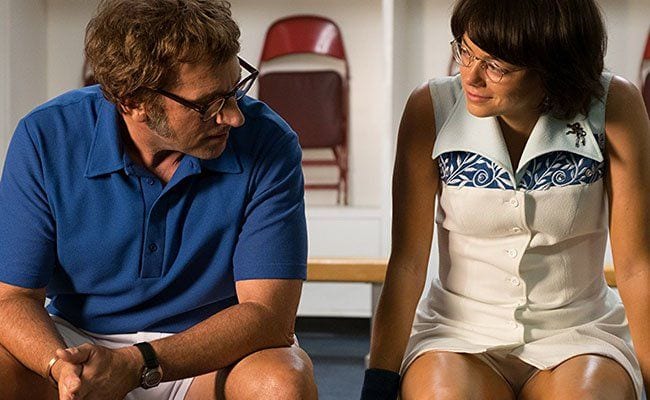
Some stories are just too big for the confined arena of cinema. The new biopic, Battle of the Sexes, takes a general survey approach to the epic 1973 tennis match between the top female player in the world, Billie Jean King, and the self-proclaimed face of male chauvinism, 55-year-old Bobby Riggs. Co-directors Jonathan Dayton and Valerie Faris lovingly re-create the look and atmosphere of a critical period in America’s inexorable (and ongoing) march towards gender equality. These were heady times, and Dayton and Faris, along with their uniformly excellent cast, take the angst and upheaval very seriously.
Your enjoyment of Battle of the Sexes will be helped with familiarity with not only the titular tennis match but the social backdrop that made it resonate so profoundly. The uninitiated will find a crowd-pleasing sports yarn with an extra layer of thematic substance. To those fluent in the history and politics of the time, however, this will be a frustrating hodgepodge of tantalizing ideas and unconvincing drama.
It’s almost impossible to articulate the seismic shift in gender politics that was occurring in the early ’70s in America. Congress passed the Equal Rights Amendment and the Supreme Court made its controversial decision on Roe v. Wade, while Title IX was opening new educational opportunities for women on college campuses.
And yet, women still earned pennies on the dollar compared to men and were subject to a level of institutionally and socially endorsed condescension that borders on the abusive. When Billie Jean King (Emma Stone), outraged that female tennis players made a fraction of what their male counterparts earned on the tour, broke from the United States Lawn Tennis Association to form a new union (hilariously endorsed by Virginia Slims cigarettes), she was challenging a patriarchal system that genuinely believed women were incapable of handling the stress of competition.
Proving once again that some things will never change, the general public bypassed these monumental social landmarks in favor of the sensational. In this case, over 90 million Americans watched King battle Riggs (Steve Carell), a former tennis champion and certified hustler, in a spectacle that was part circus and part professional wrestling. Riggs was the classic heel, eager to indulge the hatred of his enemies, while King was the virtuous battler who wanted to change the world. It was great theater, even if you hated tennis.
No matter how sensational the tennis match, however, it couldn’t touch the drama building in King’s personal life. Already married to her longtime friend, Larry (Austin Stowell), King must confront the growing realization that she’s sexually attracted to women. A sudden fling with her hairdresser (Andrea Riseborough as ‘Marilyn’) threatens to upset her marriage, the fragile new tennis union, and her carefully crafted public persona.
So how, with all of this human drama and historical heft at its core, does Battle of the Sexes still manage to fall flat?
The answer lies in the enormity of what King accomplished. She didn’t just win a tennis match; she started a fledgling union, hid a secret identity, became the face of the Equal Rights movement, and ascended to the top of the sports world. Capturing all of those elements, along with the zeitgeist of the early ’70s, is the stuff of in-depth documentaries. That co-directors Jonathan Dayton and Valerie Faris (Little Miss Sunshine, 2006) sideswipe most of these issues rather than hitting them headlong is a consequence of time rather than intention.
With only two hours to tell the story, the filmmakers must settle for the most superficial treatment of highly complex issues. One minute King is flirting with Marilyn and the next minute they’re in love. Much is made of King’s obsessive drive for tennis perfection, and yet her training regimen is limited to one quick montage. When Larry and Marilyn finally meet — clearly aware of the station their rival holds in King’s personal life — all Larry can manage is a glib observation that tennis is King’s first love. This is a story that needs to breathe, but the cluttered narrative suffocates all of the nuance and tension.
Even more disappointing is the way Riggs is used. Carell, who bears an uncanny resemblance to the aging huckster, is a livewire whenever he appears on the screen. In arguably the film’s best scene, Riggs convinces a Gambler’s Anonymous support group that he can turn them from “gamblers to hustlers” if they follow his degenerate lead. Otherwise, Riggs is little more than a buffoonish caricature, pining for the affections of his disgruntled wife (Elisabeth Shue) and hustling friends out of their cash and cars. The match between King and Riggs isn’t formalized until midway through Battle of the Sexes, a crippling narrative decision that kills any forward momentum.
There’s still plenty to admire here, including the decision to shoot on glorious 35mm film. This gives a natural graininess to the textures, empowering the filmmakers to capture the look and feel of the ’70s without relying on distracting tropes (like comical fashion choices). The performances by Stone and Carell are solid, with Stone looking particularly comfortable on a tennis court. Though the climactic match is re-enacted by tennis pros (and stunt doubles), Stone looks completely at ease with a clunky wooden racket in her hand.
Battle of the Sexes will make you feel good, despite its preordained conclusion. There’s certainly value in that simplest of pleasures, but this truncated treatment leaves you wanting so much more. If this film introduces younger audiences to an amazing historical figure like Billie Jean King, then, perhaps, its many shortcomings can be excused. Still, at a time when boorish behavior and cavalier sexism is making daily headlines in Washington, you expect a bit more bite from something this socially relevant. It’s a shame that Battle of the Sexes feels like little more than a primer to a different, more fascinating film.


![Call for Papers: All Things Reconsidered [MUSIC] May-August 2024](https://www.popmatters.com/wp-content/uploads/2024/04/all-things-reconsidered-call-music-may-2024-720x380.jpg)



